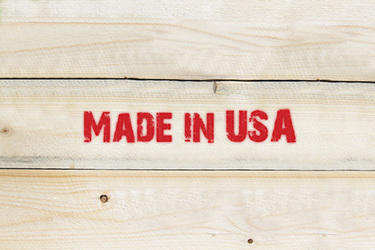6 CEOs Weigh In On The Supply Chain, Nationalism, And The Reshoring Of Biopharma Manufacturing

By Rob Wright, Chief Editor, Life Science Leader
Follow Me On Twitter @RfwrightLSL

The pandemic has certainly been a pain in the neck. But it also has brought to light many opportunities for the biopharmaceutical industry. For example, back in March, China threatened to cut off the supply of medicines it makes to the United States. Most of us knew that a significant amount of biopharmaceutical manufacturing had been offshored to places like China and India. However, most of us (despite Louis Garguilo, chief editor of Outsourced Pharma, having written about this as a problem rising on the horizon for years), never thought a supposed trade ally would ever actually use this as a point of leverage to try to get its way. Since then, the federal government has realized the importance of the U.S. biopharmaceutical industry as a critical strategic asset and is making efforts to reshore various components of biopharmaceutical manufacturing to ensure American safety and security when it comes to medicines. What do biopharmaceutical executives have to say about this reshoring or other issues impacting the supply chain?
For Life Science Leader’s annual outlook issue (published in December), we posed questions on the reshoring effort, regionalism/nationalism initiatives, and the continued China/U.S. trade war to multiple biopharmaceutical executives. As we couldn’t fit all of their thoughts in this year’s print edition, we opted to share it via the online-exclusive section, Beyond The Printed Page. Don’t want to miss out on what else they had to say? Then, be sure to become a Life Science Leader subscriber today. For we have more than 50 biopharmaceutical executives taking part in this year’s annual outlook issue, and many more will be sharing their best business practice stories throughout 2021 — and beyond.
WITH THE CURRENT ADMINISTRATION INSTITUTING PROGRAMS TO RESHORE AMERICAN BIOPHARMA MANUFACTURING, WHAT OPPORTUNITIES DOES THIS PRESENT?
 PETER HEIFETZ, PH.D., CEO, ORPRO THERAPEUTICS
PETER HEIFETZ, PH.D., CEO, ORPRO THERAPEUTICS
The current administration’s push to bring biopharma manufacturing back to the U.S. may increase capacity in the long term, but also creates near-term bottlenecks as clients compete for an initially limited pool of domestic manufacturing slots. There are economic reasons why fermentation and mammalian cell manufacturing has steadily migrated away over the past years. Changing this will be expensive, and there also will be uncertainty should a new administration reverse course. All this results in risk for the CMO/CDMO industry and client companies. As an example, NIH grants now push back on ex-U.S. manufacturing and contract research. This limits the scope of potential manufacturing partners and also decreases the proportion of grant funds that can be spent on other components of R&D. Constructing and validating a biopharma manufacturing facility takes years and significant capital, so these gaps will likely persist for some time. COVID also has increased costs, especially for materials. Increasing domestic biologics manufacturing will ultimately result in greater flexibility, but it comes with increased expense today.
 RICK MODI, CEO, AFFINIA THERAPEUTICS
RICK MODI, CEO, AFFINIA THERAPEUTICS
For every biopharma company, continuity and stability of the supply chain are critically important. Given these networks are multinational, changes are costly and lead times are long and involve contractual and regulatory hurdles with third parties. As such, any sudden or unforeseen geopolitical change affecting the supply chain can have seismic implications. Looking at this from the perspective of a gene therapy company, where the product is also the manufacturing process, most manufacturing is being conducted in the same country where the fundamental research is being done. With that in mind, we’re not seeing as much of a “reshoring” shake-up, because for U.S.-based gene therapy companies, manufacturing has typically been within the U.S.. However, as patients are worldwide, having a strong global supply chain from the manufacturing site to where the therapy is administered is important. But the scale economies that moved other biopharmas to offshore has not been a driver in gene therapy. This is because gene therapy is driven by a relatively small number of patients, leading to a focus on smaller batches versus mass production, and putting in place a strong global supply chain with tight surveillance to assure quality and integrity. Outside of gene therapy, the impact of reshoring can be large. In particular, the impact on CMO/CDMO companies may be even more amplified, as many have attempted to cost-optimize the value chain over the years via offshoring. Reconfiguring the manufacturing and supply chain networks takes significant regulatory discussion and long lead times to execute.
 ADRIAN RAWCLIFFE, CEO, ADAPTIMMUNE
ADRIAN RAWCLIFFE, CEO, ADAPTIMMUNE
We have been located in Philadelphia for almost 10 years and have close to 200 employees there where we manufacture our cells. We are committed to creating jobs and opportunities where we are located, namely Philadelphia and the UK, where we have close to 250 additional employees. We will make future decisions on where talent lies and what is required to supply our product to the markets we operate. So, how could this reshoring impact those truly global companies? There are always ebbs and flows in regulations and policies, such as what we see in the U.S., but also in the U.K. with Brexit. There will be potential short-term economic impact on companies conducting their manufacture ex-US, but they will adapt. While a balanced economy is clearly important, and the U.S. is well positioned on the biopharma manufacturing talent front, for us it is important to continue to develop the talent pool in the regions where we work. Also, because we are an individualized treatment, it is easier to be collocated with the patients who can most benefit from our treatment.
HOW DO YOU ANTICIPATE THE CONTINUED U.S.-CHINA “TARIFF WAR” OR OTHER MOVES OF NATIONALISM/REGIONALISM IMPACTING BIOPHARMA IN 2021 AND BEYOND?
 EVAN LOH, M.D., CEO, PARATEK PHARMACEUTICALS
EVAN LOH, M.D., CEO, PARATEK PHARMACEUTICALS
The U.S.-China tariff war has highlighted the fragility of global supply chains for many industries, especially in regions directly affected by tariff disputes. This fragility is especially prevalent in the biopharma sector, where China supplies 40% of all APIs globally and, where India supplies 75% to 80% of APIs to the U.S. For antibiotics in particular, the vulnerability of global supply chains has been underscored by the COVID-19 pandemic. As essential components of pandemic preparedness, antibiotics are vital to national security. Yet, China supplies the majority of generic antibiotics on which we rely. We are therefore seeing a clear movement within the biopharma industry toward securing supply chains for medicines that are essential to preparing for the next pandemic.
 ARMON SHAREI, PH.D., CEO, SQZ BIOTECH
ARMON SHAREI, PH.D., CEO, SQZ BIOTECH
Since the U.S. and China are two of the largest economies in the world, it is pertinent that we find a workable solution for our industry. Given that healthcare should be an essential service for every country, it is important to continue to put patients at the forefront of everything we do. As a result, I believe the two countries will find a solution that maintains adequate drug access globally. However, one potential shift would be development of increased domestic redundancies in the supply chain to make both governments feel sufficiently independent of the other in case of a crisis.
 DIETRICH STEPHAN, CEO, NEUBASE THERAPEUTICS
DIETRICH STEPHAN, CEO, NEUBASE THERAPEUTICS
At a macro level across the globe, there is an increasing cadence, on an exponential curve, in the ability to translate basic insights into therapeutics. While the U.S. is still the world leader, other countries are making tremendous strides. The U.S. moving toward a more nationalistic framework has encouraged other countries, namely China, to own their destiny with respect to therapeutic development. As a nation, China has decided to home-grow its industry and established a support infrastructure propelling it to the forefront of innovation. Ultimately, this isn’t a bad thing, as long as we can facilitate the fair exchange of ideas and therapies to allow global access.
